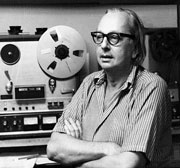Peter Fritsch, founder of the independent world and classical music label, Lyrichord Discs, and a West Villager for over 60 years, died April 22 at St. Vincent’s Hospital in Greenwich Village after a long illness at the age of 85. He had been in the hospital about six weeks.
Fritsch, was born in the small Austrian town of Zellamoss in 1919. After coming to America in the mid-1930s, he graduated from Louisiana State University and Harvard Business School. Fritsch then worked at several occupations including in an armaments plant during the war, as an ad copy writer and briefly as a film critic for McCall’s magazine.
His love of music eventually drew him to the record business, and in the late 1940s he became an executive at the Musicraft Records label in New York City. In 1950, he founded the Lyrichord label, largely with the $10,000 prize money won in a jingle contest by his wife, Theresa Fritsch, who worked at his side at Lyrichord for just over 40 years.
Though Lyrichord was started as a classical label, international contacts that Fritsch had made while at Musicraft soon led to the inclusion of international ethic music to their record roster. Lyrichord became one of the first labels to publish the recordings made throughout the world as fieldwork by anthropologists, ethnomusicologists and doctoral candidates. Throughout the ’50s and early ’60s, Lyrichord’s international music archive grew to include such notable recordings as “Music of the Rainforest Pygmies,” recorded in the Ituri rain forest by Colin Turnbull, as well as many others.
From 1958 to 2001, Lyrichord was housed in the basement of the townhouse the Fritsches owned at 141 Perry St. In 1970, they also acquired a property on Washington Pl., where they have lived since.
During the 1960s, Peter and Theresa Fritsch became deeply committed to community activism and were founding members of the West Village Committee. Along with author Jane Jacobs and other members of the Committee, they were tireless fighters against plans for urban renewal that would have leveled the Far West Village, Robert Moses’ proposed Broome St. Expressway and the Westway landfill-and-highway plan of the ’70s. Fritsch’s efforts, along with those of Jacobs and others, helped get the plan approved for the low-rise, middle-income West Village Houses, and Fritsch spent two years meticulously documenting the construction of the project in photographs and films.
In addition to his wife, Theresa, Fritsch is survived by two daughters, Erica and Christina, a son, Nicholas, and two granddaughters. A private memorial for friends is planned.

































